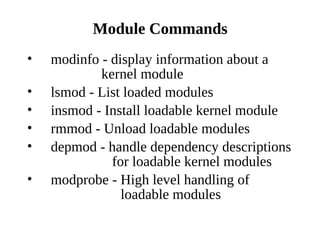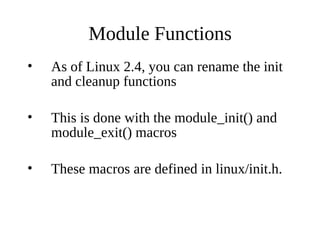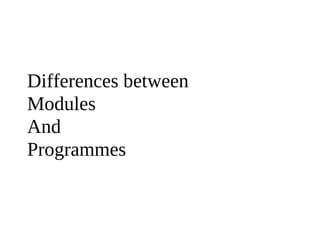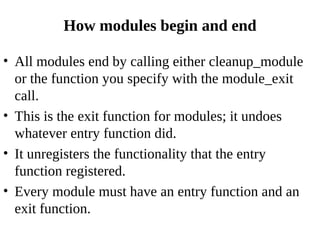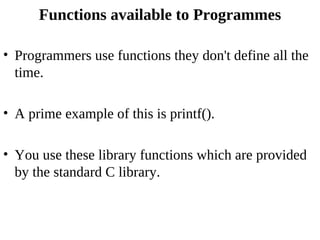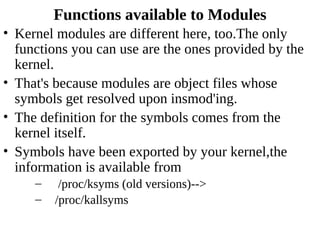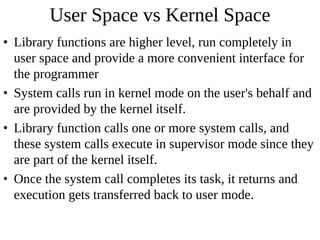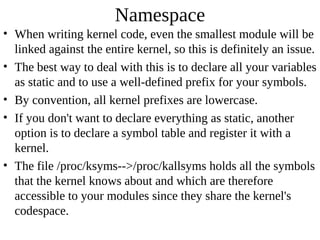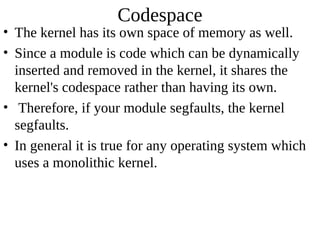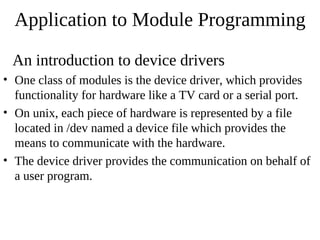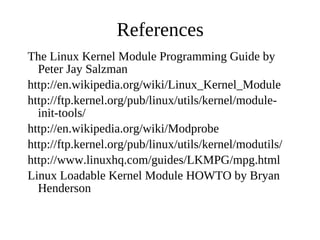Kernel Module Programming
- 2. Kernel Modules What exactly is a kernel module ? • Modules are pieces of code that can be loaded and unloaded into the kernel upon demand. • They extend the functionality of the kernel without the need to reboot the system. • For example, one type of module is the device driver, which allows the kernel to access hardware connected to the system. • Without modules, we would have to build monolithic kernels • Larger kernels,disadvantage of requiring us to rebuild and reboot the kernel every time for new functionality.
- 3. OS Basics • Linux operates in two modes • Kernel mode (kernel space) and • User mode (user space) • So kernel architectures depending upon this • Monolithic • Micro-kernel
- 4. Monolithic kernels • Kernel implemented as an only one process • Large program where all the functional components of the kernel have access to all of its internal data structures and routines Micro-kernels • kernel perform only the essential operations • Everything else should be performed in user space • Memory management, file systems and IPC communications are not inside the kernel
- 5. And the linux kernel is...? • Monolithic, but it is also modular • Kernel can dynamically load parts of the kernel code(Modules) • Possible to extend the kernel capabilities without modifying the rest of the code • Possible to insert the module while the kernel is running • Keeps the kernel size to a minimum and makes the kernel very flexible
- 6. Module Commands • modinfo - display information about a kernel module • lsmod - List loaded modules • insmod - Install loadable kernel module • rmmod - Unload loadable modules • depmod - handle dependency descriptions for loadable kernel modules • modprobe - High level handling of loadable modules
- 7. How Do Modules Get Into The Kernel? Modules already loaded into the kernel can be seen by running lsmod kernel daemon(kerneld daemon or kmod) execs modprobe to load the module in • modprobe is passed a string in one of two forms: -A module name like softdog or ppp. -A more generic identifier like char-major-10-30.
- 8. How Do Modules Get Into The Kernel? • If modprobe is handed a generic identifier, it first looks for that string in the file /etc/modprobe.conf--> /lib/modules/version/modules.alias • If it finds an alias line like: alias char-major-10-30 softdog • Then dependencies are seen • For example, msdos.ko requires the fat.ko module to be already loaded into the kernel. • modprobe uses insmod to first load any prerequisite modules into the kernel, and then the requested module
- 9. How Do Modules Get Into The Kernel? • Linux distributions provide modprobe, insmod and depmod as a package called modutils or mod-utils. • Until 2.4 kernel versions, module file & object file had same extension i.e. .o • From 2.4 & above to differentiate between object file & module file, module file has extension .ko
- 10. Module Unloading • Modules can be unloaded using rmmod command • rmmod ensures the restriction that the modules are not in use • Automatically removed from the system by `kerneld' when they are no longer used • cleanup_module function of the concerned module is called to freeup the kernel resources it has allocated • Unlinked from the kernel and unlisted from the list of kernel modules • Dependency is released
- 11. Module Functions • Kernel modules must have at least two functions. • A "start" (initialization) function called init_module( ) which is called when the module is insmoded into the kernel • Typically, init_module( ) either registers a handler for something with the kernel. • An "end" (cleanup) function called cleanup_module ( ) which is called just before it is rmmoded. • The cleanup_module( ) function is supposed to undo whatever init_module( ) did, so the module can be unloaded safely.
- 12. Module Functions • As of Linux 2.4, you can rename the init and cleanup functions • This is done with the module_init() and module_exit() macros • These macros are defined in linux/init.h.
- 13. Using printk( ) • printk seems to be the similar function like printf • Since we are dealing with kernel programming , kernel can’t access user library functions • So only functions used by modules are the one defined by kernel. • printk( ) happens to be a logging mechanism for the kernel, and is used to log information or give warnings. • There are 8 priorities and the kernel has macros for them, and you can view them (and their meanings) in linux/kernel.h.
- 14. Using printk( ) • If you don't specify a priority level, the default priority, DEFAULT_MESSAGE_LOGLEVEL, will be used • We usually use a high priority, like KERN_ALERT • When you write real modules, you'll want to use priorities that are meaningful for the situation at hand.
- 16. How programmes begin and end Program begins with a main() function, executes a bunch of instructions and terminates upon completion of those instructions. • Module begins with either the init_module or the function you specify with module_init call. • This is the entry function for modules; it tells the kernel what functionality the module provides and sets up the kernel to run the module's functions when they're needed. • Once it does this, entry function returns and the module does nothing until the kernel wants to do something with the code that the module provides.
- 17. How modules begin and end • All modules end by calling either cleanup_module or the function you specify with the module_exit call. • This is the exit function for modules; it undoes whatever entry function did. • It unregisters the functionality that the entry function registered. • Every module must have an entry function and an exit function.
- 18. Functions available to Programmes • Programmers use functions they don't define all the time. • A prime example of this is printf(). • You use these library functions which are provided by the standard C library.
- 19. Functions available to Modules • Kernel modules are different here, too.The only functions you can use are the ones provided by the kernel. • That's because modules are object files whose symbols get resolved upon insmod'ing. • The definition for the symbols comes from the kernel itself. • Symbols have been exported by your kernel,the information is available from – /proc/ksyms (old versions)--> – /proc/kallsyms
- 20. User Space vs Kernel Space • Library functions are higher level, run completely in user space and provide a more convenient interface for the programmer • System calls run in kernel mode on the user's behalf and are provided by the kernel itself. • Library function calls one or more system calls, and these system calls execute in supervisor mode since they are part of the kernel itself. • Once the system call completes its task, it returns and execution gets transferred back to user mode.
- 21. Namespace • When writing kernel code, even the smallest module will be linked against the entire kernel, so this is definitely an issue. • The best way to deal with this is to declare all your variables as static and to use a well-defined prefix for your symbols. • By convention, all kernel prefixes are lowercase. • If you don't want to declare everything as static, another option is to declare a symbol table and register it with a kernel. • The file /proc/ksyms-->/proc/kallsyms holds all the symbols that the kernel knows about and which are therefore accessible to your modules since they share the kernel's codespace.
- 22. Codespace • The kernel has its own space of memory as well. • Since a module is code which can be dynamically inserted and removed in the kernel, it shares the kernel's codespace rather than having its own. • Therefore, if your module segfaults, the kernel segfaults. • In general it is true for any operating system which uses a monolithic kernel.
- 23. Application to Module Programming An introduction to device drivers • One class of modules is the device driver, which provides functionality for hardware like a TV card or a serial port. • On unix, each piece of hardware is represented by a file located in /dev named a device file which provides the means to communicate with the hardware. • The device driver provides the communication on behalf of a user program.
- 24. References The Linux Kernel Module Programming Guide by Peter Jay Salzman http://en.wikipedia.org/wiki/Linux_Kernel_Module http://ftp.kernel.org/pub/linux/utils/kernel/module- init-tools/ http://en.wikipedia.org/wiki/Modprobe http://ftp.kernel.org/pub/linux/utils/kernel/modutils/ http://www.linuxhq.com/guides/LKMPG/mpg.html Linux Loadable Kernel Module HOWTO by Bryan Henderson
- 26. Thank You ... Saurabh S. Bangad






